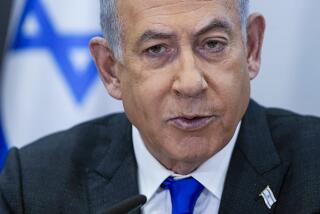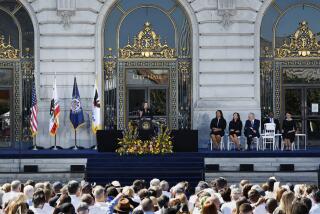Capitol Tribute to Mme. Chiang a Sign of Change
- Share via
WASHINGTON — In a new sign of the dramatic change on Capitol Hill toward China, members of Congress--including Senate Majority Leader Bob Dole (R-Kan.)--are planning a Capitol Hill reception next week for Madame Chiang Kai-shek, the aged, long-forgotten leader of the Nationalist Party that once ruled the Chinese mainland.
The ceremonies, to which some Clinton Administration officials and three former Presidents have been invited, come at a most awkward time for relations between the United States and China’s Communist regime. The main source of these tensions has been Taiwan--and Mme. Chiang is an enduring symbol of America’s onetime support for Taiwan’s Nationalist regime, ousted from mainland China at the end of the country’s civil war.
Sen. Paul Simon (D-Ill.), who is a co-sponsor of the event along with Dole, said that honoring Mme. Chiang is “a gesture of friendship between the people of China and the people of the United States.”
The view of China’s Communist government, of course, is that the people of China threw out the Nationalists.
Warren Cohen, a specialist in U.S.-China relations at the University of Maryland-Baltimore County, said Tuesday that “with things [between Washington and Beijing] this tense, anything like this is gratuitous.”
But a senior Administration official insisted of the ceremonies for Mme. Chiang: “I don’t think it is a significant problem” for U.S. relations with China.
So far, China has not commented on the event. But the congressional invitation has already drawn strong criticism from Taiwan’s Democratic Progressive Party, which favors independence for the island of Taiwan and opposes the Nationalists’ position that China and Taiwan should eventually be under one government.
Mme. Chiang “is one has-been despot better left ignored,” said DPP legal counsel Kok-ui Lim.
For Mme. Chiang, now 96, whose Chinese name is Soong May-ling, the event will be sweet vindication. She has been living in obscurity in the New York area for a decade. She has not appeared in Washington since she gave a speech at the National Press Club in 1966, long before President Richard Nixon’s historic trip to Beijing.
But for years, her name, face and voice were familiar to millions of Americans. She was Generalissimo Chiang Kai-shek’s emissary to this country--the U.S.-educated woman who worked tirelessly to line up American money and arms for the Nationalists’ unsuccessful campaigns against the Communists.
In 1943, she addressed both houses of Congress at the invitation of President Franklin D. Roosevelt. Later, however, she and her husband were scathingly criticized by President Harry S. Truman for running a corrupt, inefficient government. None of the three former presidents invited to next week’s reception has accepted.
As Taiwan’s First Lady from 1949 until her husband’s death in 1975, she helped spearhead Taiwan’s efforts to retake the mainland and to prevent the United States from recognizing the People’s Republic of China.
Dole’s willingness to sponsor the event for Mme. Chiang also underscores the extent to which the current leadership of the Republican Party seems gradually to be shifting course on policy toward China and Taiwan.
In the years after Nixon’s opening to Beijing, some leading conservatives such as former Sen. Barry Goldwater (R-Ariz.) urged the United States to maintain diplomatic relations with Taiwan and avoid recognizing the People’s Republic. But at the time, they were in the minority.
But earlier this month, House Speaker Newt Gingrich (R-Ga.) suggested in a television interview that the United States should recognize the Nationalist regime in Taiwan. He has since voiced some second thoughts about saying that.
Last month, China erupted in fury after the Administration, responding to congressional pressure, permitted Taiwanese President Lee Teng-hui to come to the United States on a private visit, the first ever by a leader of Taiwan.
More to Read
Sign up for Essential California
The most important California stories and recommendations in your inbox every morning.
You may occasionally receive promotional content from the Los Angeles Times.













